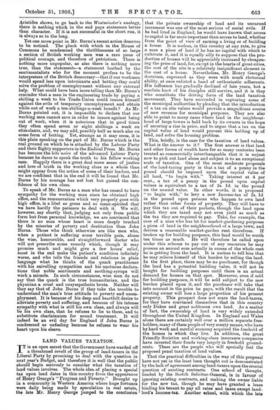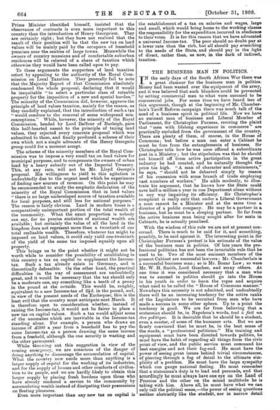LAND VALUES TAXATION.
IT is an open secret that the Government have warded off a threatened revolt of the group of land-taxers in the Liberal Party by promising to deal with the question in next year's Budget, and therefore it is well that the public should begin seriously to consider what the taxation of land values involves. The whole idea of placing a special tax upon land dates in this country from the appearance of Henry George's "Progress and Poverty." Brought up in a community in Western America where huge fortunes were daily being made by speculation in real estate, the late Mr. Henry George pulped to the conclusion that the private ownership of land and its unearned increment was one of the most serious of social evils. It he had lived in England, he would have known that access to capital is far more important than access to land, whether from the point of view of earning a living or of building a house. It is useless, in this country at any rate, to give a man a piece of land if he has no capital with which to cultivate it, and it is equally silly to suppose that the pro, duction of houses will be appreciably increased by cheapen- ing the price of land, for, except in the hearts of great cities, the cost of the site is a relatively insignificant element in the cost of a house. Nevertheless, Mr. Henry George's doctrines, expressed as they were with much rhetorical ability, at once enlisted a band of enthusiastic adherents. His influence has gradually declined of late years, but a resolute knot of his disciples still survive, and it is they who constitute the driving force of the land taxation movement. They have succeeded in capturing some of the municipal authorities by pleading that the introduction of a tax on site values would provide a magnificent source of new revenue for municipal purposes. They are aloe able to point to many cases where laud. in the neighbour- hood of large towns is held back by its owners in the hope of securing a rise in price, and to argue that a tax on the capital value of land would prevent this holding up pf land, and solve the housing problem.
This, briefly, is the case for the taxation of land values. What is the answer to it? The first answer is that land and other forms of wealth have for so many centuries been treated as commercially interchangeable that it is unjust now to pick out land alone and subject it to an exceptional scale of taxation. One of the most moderate proposals of the land-taxing party is that a tax of a penny in the pound should be imposed upon the capital value of all laud, "to begin with." Taking interest at 4 per cent., a tax of a penny in the pound upon capital values is equivalent to a tax of 2s. id. in the pound on the annual value. In other words, it is proposed "to begin with," to levy a new Income-tax of 2s. ld in the pound upon persons who happen to own land rather than other forms of property. They will have to pay this tax out of their pockets, though the land upon which they are taxed may not even yield as much as the tax they are required to pay. Take, for example, the case of a man who has let for market-gardening purposes a piece of land in the neighbourhood of a large town, and derives a reasonable market-garden rent therefrom. If broken up for building purposes, this land would be worth ten times as much. He will therefore be called upon under this scheme to pay out of any resources he may possess an annual sum actually in excess of the whole rent he is getting from the land. It is useless to tell him that he may relieve himself of this burden by selling the land. In the first place, there may be no purchaser, for though the laud has a potential building value, it will not be bought for building purposes until there is an actual demand for houses on that spot. Moreover, even if sold for building purposes, it will be sold subject to the new burden placed upon it, and the purchaser will take that into account in the price he pays, with the result that the existing owner will lose a large proportion of his present property. This prospect does not scare the land-taxers, for they have convinced themselves that in this country only Dukes and great noblemen own land. As a matter of fact, the ownership of land is very widely extended throughout the United Kingdom. In England and Wales alone there are certainly well over a million separate free- holders, many of them people of very scanty means, who have by hard work and careful economy acquired the freehold of the homes in which they live. In addition, the great Friendly Societies and working-class insurance companies have invested their funds very largely in freehold ground- rents. These are the people who will specially feel the proposed penal taxation of land values.
That the practical difficulties in the way of this proposal have not yet in the least been thought out is demonstrated by the lack of agreement among land-taxers upon the crucial question of existing contracts. One school of thought., headed by the Scotch Solicitor-General, is in favour of ignoring existing contracts, and making the owner liable for the new tax, though he may have granted a lease binding his tenant to pay all rates and taxes except land- lord's lacome-ta.T. Another school, with which the late Prime Minister identified himself, insisted that the observance of contracts is even more important to this country than the introduction of Henry Georgeism. They are certainly right ; but they have not realised that the result of their position will be that the new tax on land values will be mainly paid by the occupiers of leasehold premises near the centres of large towns. Meanwhile the owners of country mansions and of comfortable suburban residences will be relieved of a share of taxation which otherwise they would have been called upon to pay.
To these arguments the supporters of land taxation retort by appealing to the authority of the Royal Com- mission on Local Taxation. They generally fail to note that the Majority Report of that Commission absolutely condemned the whole proposal, declaring that it would be inequitable "to select a particular class of rateable property for the imposition of a new and special burden." The minority of the Commission did, however, approve the principle of land values taxation, mainly for the reason, as they candidly explained, that the introduction of such a tax "would conduce to the removal of some widespread mis- conceptions." While, however, the minority of the Royal Commission, headed by Lord Balfour of Burleigh, gave this half-hearted assent to the principle of taxing laud values, they rejected every concrete proposal which was submitted to them, and finally produced a scheme of their own which not a single advocate of the Henry Georgeite group could for a moment accept.
The scheme of the minority members of the Royal Com- mission was to impose a very small tax on land values for municipal purposes, and to compensate the owners of urban land by a heavy subsidy out of the Imperial Treasury. This, at any rate, will not be Mr. Lloyd George's proposal. His willingness to yield to this agitation is undoubtedly due to the urgent need which he experiences of finding new sources of revenue. On this point he may be recommended to study the emphatic declaration of the minority of the Royal Commission that in land values "there is no large undeveloped source of taxation available for local purposes, and still less for national purposes." The reason is fairly obvious. Land in modern times is a comparatively unimportant portion of the total wealth of the community. What the exact proportion is nobody can say, for no precise statistics of national wealth are available ; but certainly the value of all the land in the kingdom does not represent more than a twentieth of our total realisable wealth. Therefore, whatever tax might be imposed on land values, it could only yield one-twentieth of the yield of the same tax imposed equably upon all property. This brings us to the point whether it might not be worth while to consider the possibility of establishing in this country a tax on capital to supplement the Income- tai. Such a tax already exists in Germany, and is theoretically defensible. On the other hand, the practical difficulties in the way of assessment are undoubtedly great, and it would be necessary that the tax should only be a moderate one, say something like a tenth of a penny in the pound at the outside. This would be, roughly, equivalent to a new Income-tax of 20. in the pound, and, in view of the present needs of the Exchequer, this is the least evil that the country must anticipate next March. It is therefore open to consideration whether, instead of raising the Income-tax, it would not be fairer to place a new tax on capital values. Such a tax would adjust some of the anomalies which are inevitable in the Income-tax standing alone. For example, a person who draws an income of £500 a year from a leasehold has to pay the same Income-tax as a person drawing the same income from a freehold, although the one security is wasting and the other permanent. While throwing out this suggestion in view of the coining emergency, we are conscious of the danger of doing anything to discourage the accumulation of capital. What the country now needs more than anything is a larger supply of capital for the working of its industries, and for the supply of houses and other comforts of civilisa- tion to its people, and we are hardly likely to obtain this larger supply by placing fresh burdens upon those who have already rendered a service to the community by accumulating wealth instead of dissipating their possessions on fleeting pleasures.
Even more important than any new tax on capital is the establishment of a tax on salaries and wages, large and small, which would bring home to the working classes the responsibility for the expenditure incurred in obedience to their votes. It is for this reason that we have advocated a universal Income-tax. The poor should no doubt pay at a lower rate than the rich, but all should pay something to the needs of the State, and should pay in the light of direct, rather than, as now, in the dark of indirect, taxation.















































 Previous page
Previous page